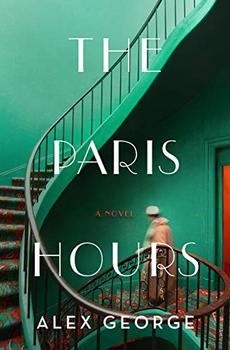Happiness is such a subjective topic. Guillaume was such a needy and obsessive character that I’m not sure what would make him happy. He strikes me as someone who would decide he needed a certain thing to be happy, attain it and then not be happy and blame it on the thing he pursued and then attained. He left home, came to Paris to paint and was he happy? He didn’t become the famous painter he aspired to be and he threw himself headlong into an obsession with an acrobat who became a one night stand. Pinning your happiness on acquiring something/someone or on things you have no control over is not likely to make you happy. Happiness is something that comes from within, it is a gift you give yourself when you are able to do so. Sauren could not forgive himself. He could not be kind to himself, and although he was friends with Suzanne and her daughter, and finds small joys in their company , he is alone and haunted by his past. When Thérèse tends to his hand - George describes it as “ Thérèse is giving him something more valuable than the most expert medical attention. The last time someone looked at him with such kindness, he’d been no more than a boy: François, sitting by her dead son’s bed, feeding him and teaching him French. Ever since he crept out of that house and escaped into the moonlit night, the world has been an unbearably lonely place.” Souren finally speaks to the two elderly Armenian men, but only briefly. He could have looked for areas where Armenians frequented in Paris and perhaps found some fellowship, whether at bars, or places of worship. He did not choose to do so and I think it was because he felt he didn’t deserve to be happy. I wonder when that really hit him. He was running for his life, trying to survive, to escape and he did. Had he wanted to give up or be punished for allowing his brother to die he could have easily been killed during his escape. Perhaps it was only seeing his friend Younis with his brothers and his discussion about family that rekindles such deep agony. When Souren sees the painting he is mesmerized by it. He thinks of it as “ the little white house and all of the unreachable promise hiding within its walls.” Souren already views happiness or whatever the house represents as unattainable. So for Souren he didn’t pursue happiness because he felt for him, since the death of his brother it was unattainable and perhaps he felt he didn’t deserve it. For some reason Camille strikes me as vapid, but with a glimmer of something deeper and also conniving. She seems to have been happiest tending to Proust and being in his orbit. Her happiness seemed tied, after his death, to the ownership of the last notebook. She has a husband and a child, but doesn’t really seem to delight in either. She escapes to put flowers on Proust’s grave. She is aware that the greatest gift Proust gave her was her independence, which makes me think she has more layers to her than I initially thought. I think for Camille this “ gift of independence” , has made her happy in a way in that it has given her resilience. It has given her strength to stand up to Olivier and do as she wants. Jean-Paul writes down his story to bring himself peace, as a way to memorialize Elodie and also as a record for her should she ever read it. Jean-Paul has lost his family and he has no idea where his daughter is. I can’t imagine he would ever think of being “ happy” . He carries such a burden. I only hope he finds moments of joy.
I am struck by how much loss these characters endure. Souren loses his father, brother and mother and his country. Jean-Paul loses his wife and child and endures a physical handicap. In Jean -Paul’s case his daughter’s fate is unknown to him. Camille loses her mother but gains her independence and with Olivier keeps another woman’s child. This thoughtless act brings immense lifelong pain to Jean-Paul. What of Guillaume? What has he lost? His fantasy of fatherhood and a lifelong connection to Suzanne? A woman who was a one night stand and told him she was not interested in a further relationship? His dream of living in Paris and being a famous and successful painter? He can still work and pursue that dream. It seems to me some have lost so much more than others and that agency to attain happiness will depend on the strength of each individual. As a side note: there is so much fire in this book. The burning of the notebooks, Hector, Souren’s hand, the puppet Hector, Le Chat Blanc, Souren, Jean-Paul’s notebook. Suzanne does not wait for Guillaume after the fire and as fire is often a metaphor for cleansing and rebirth, I wonder if, in some of these cases the characters will now be more free to start over, to search for better times. Perhaps now Guillaume will leave Paris and forget his obsession of Suzanne, Jean-Paul may now move on ... in one way or the other. Camille as well .. I guess we can only imagine.



